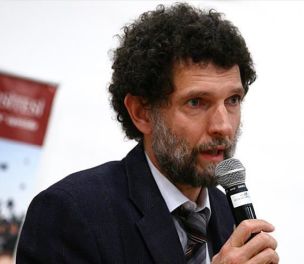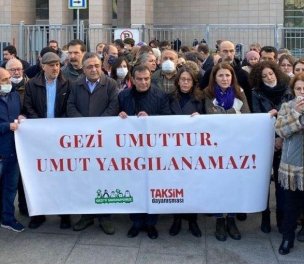Click to read the article in Turkish
The Council of Europe Committee of Ministers announced after its meeting yesterday (December 2) that an infringement process had been started against Turkey for its failure to implement an ECtHR judgment regarding the imprisonment of businessperson Osman Kavala.
The committee granted Turkey a final deadline extension, requesting to submit a response until January 19, 2022.
• NOTE: In the latest hearing of the Gezi trial, the court ruled for the continuation of Kavala's arrest, ignoring the ECtHR decision once again. Kavala has been in prison since November 2017. He hadn't been indicted for the first year of his imprisonment. The next earring of the case will take place on January 17.
The Committee of Ministers initiated the infringement process as per paragraph 2 of article 46 of the European Convention on Human Rights (ECHR).
In the interim resolution adopted after yesterday's meeting, the committee cited the following reason:
- Recalling the Court's findings in the present case that the applicant's arrest and pre-trial detention took place in the absence of evidence to support a reasonable suspicion he had committed an offence (violation of Article 5, paragraph 1, of the Convention) and pursued an ulterior purpose, namely to silence him and dissuade other human rights defenders (violation of Article 18 taken in conjunction with Article 5, paragraph 1); and that the one year and nearly five months taken by the Constitutional Court to review his complaint was insufficiently "speedy", given that his personal liberty was at stake (violation of Article 5, paragraph 4);
Three countries voted down the resolutionAccording to unconfirmed reports, only three countries voted down yesterday's resolution. Negative vote: Azerbaijan, Turkey Hungary Abstaining vote: Russia, Georgia, Moldova, Romania, Serbia, Albania, Ukraine Affirmative vote: The remaining 35 member states |
What is expected from Turkey?
The results of the meeting, according to the committee records:
- The Committee of Ministers, under the terms of Article 46, paragraph 2 of the Convention for the Protection of Human Rights and Fundamental Freedoms ("the Convention"), which provides that the Committee supervises the execution of final judgments of the European Court of Human Rights ("the Court"),
- Recalling the Court's findings in the present case that the applicant's arrest and pre-trial detention took place in the absence of evidence to support a reasonable suspicion he had committed an offence (violation of Article 5, paragraph 1, of the Convention) and pursued an ulterior purpose, namely to silence him and dissuade other human rights defenders (violation of Article 18 taken in conjunction with Article 5, paragraph 1); and that the one year and nearly five months taken by the Constitutional Court to review his complaint was insufficiently "speedy", given that his personal liberty was at stake (violation of Article 5, paragraph 4);
- Recalling the respondent's State's obligation under Article 46, paragraph 1, of the Convention, to abide by all final judgments in cases to which it has been a party and that this obligation entails, in addition to the payment of the just satisfaction awarded by the Court, the adoption by the authorities of the respondent State, where required, of individual measures to put an end to violations established and erase their consequences so as to achieve as far as possible restitutio in integrum;
- Recalling also the Court's indication in the present case under Article 46 of the Convention that any continuation of the applicant's pre-trial detention would entail a prolongation of the violations of Article 5, paragraph 1, and of Article 18, as well as a breach of the obligations on respondent States to abide by the Court's judgment in accordance with Article 46, paragraph 1, of the Convention, and that in consequence Turkey was required to take all necessary measures to put an end to the applicant's detention and to secure his immediate release;
- Recalling the Committee's eight decisions and interim resolution strongly urging theauthorities to, on the one hand, ensure the applicant's immediate release and, on the other, ensure the conclusion, on the basis of the European Court's findings and without delay, of the criminal proceedings against him which have been criticised by the European Court or are based on evidence found insufficient by that Court to justify his detention;
- Considers that by failing to ensure the applicant's immediate release, Turkey is refusing to abide by the final judgment of the Court in the present case;
- Therefore, serves formal notice on Turkey of its intention, at its 1423rd meeting on 2 February 2022, to refer to the Court, in accordance with Article 46, paragraph 4, of the Convention, the question whether Turkey has failed to fulfil its obligation under Article 46, paragraph 1, of the Convention with particular regard to the Court's indication under Article 46 and the individual measures required, and invites Turkey to submit in concise form its view on this question by 19 January 2022 at the latest.
A summary of Osman Kavala's arrest17 October 2017: Osman Kavala was detained. 1 November 2017: Kavala was ordered arrest on the charges of 'attempting to overthrow the government or to prevent it from exercising its functions' (Article 312 of the TCC) and 'attempting to overthrow the constitutional order through force and violence' (Article 309 of the TCC). 24 December 2018: The investigation files under Article 309 and 312 of the TCC were separated. 19 February 2019: The first indictment against Kavala was issued under Article 312 of the TCC 16 months after he was arrested. 11 October 2019: A release order was issued in favor of Kavala on the charge under Article 309 of the TCC. 10 December 2019: The ECtHR ruled that Kavala's detention constituted a violation of human rights and that he should be released immediately. 18 February 2020: A decision of acquittal was issued in the trial heard under Article 312 of the TCC. 19 February 2020: After the decision of acquittal, Kavala was not released but was arrested again on the charge under Article 309 of the TCC. 9 March 2020: Kavala was ordered arrest under Article 328 of the TCC. 20 March 2020: The second release order was issued in favor of Kavala under Article 309 of the TCC. However, his detention on the charge of espionage under Article 328 of the TCC continued. 3 September 2020: The Committee of Ministers of the Council of Europe, which oversees the execution of the judgments of the ECtHR, ruled that the judgment of the ECtHR should be executed and that Kavala should be released immediately. 29 September 2020: The Constitutional Court of the Republic of Turkey decided to examine the application of Kavala regarding his unlawful detention. However, it postponed the examination as the second indictment including the charges under Articles 309 and 328 (espionage) of the TCC was submitted to the court on the same day. 29 September 2020: In the second meeting in which this matter was discussed, the Committee of Ministers of the Council of Europe ruled that an interim decision should be drafted to be issued in the event that the judgment of the ECtHR is not executed. 3 December 2020: The Committee of Ministers of the Council of Europe issued an interim decision that Kavala should be released immediately and that the Constitutional Court should examine the file in accordance with the judgment of the ECtHR without further delay. 15 December 2020: The Constitutional Court decided to examine the application regarding the unlawful detention and ruled that the file should be referred to the General Assembly of the Constitutional Court. 18 December 2020: The 36th Assize Court ruled that the detention shall continue. The second hearing was scheduled on 5 February. 29 December 2020: The Constitutional Court ruled with 8 to 7 votes that the decision of Kavala did not constitute any violation of right. The reasoned judgment included the strongly dissenting opinions of the judges who voted that the detention constituted a violation of rights. 22 January 2021: The Appellate Court overturned the decision of acquittal in the Gezi trial. It ruled that the file concerning this trial shall be examined together with the files under Articles 309 and 328 of the TCC. 28 January 2021: After the decision of acquittal was overturned, the 30th Assize Court issued a preliminary proceedings report and scheduled the trial concerning the consolidated files on 21 May 2021. 5 February 2021: In the trial heard in the 36th Assize Court, the Court ruled that Kavala's trial shall be consolidated with the Gezi Trial, which will be heard again in the 30th Assize Court under Article 312 of the TCC, and that the detention of Kavala on the charges of espionage under Article 328 of the TCC shall continue. 30 April 2021: As a result of its examination of the detention, the 30th Assize Court ruled that the detention of Kavala shall continue. 12 May 2021: In its weekly meeting of 12 May 2021, the Committee of Ministers of the Council of Europe reviewed Kavala's file and expressed their great concern that Turkish authorities and courts did not take the necessary steps to end Kavala's the continued detention against the judgment of the ECtHR. The Committee urged the member states to bring up the continued detention and immediate release of Kavala during their meetings with Turkish authorities. It pointed out that the detention of Kavala would be reviewed again by the 30th Assize Court on 21 May 2021, and urged the authorities to take all the necessary steps to ensure the release of Kavala. 21 May 2021: At the hearing held by the İstanbul 30th High Criminal Court, the court board ruled that Osman Kavala's arrest on "espionage" charges should continue. The court board also demanded that the Gezi file about the çArşı group should be examined in consideration of a possible merging of the cases and be sent back to the court. 9 June 2021: The Committee of Ministers of the Council of Europe announced that it would bring infringement proceedings against Turkey in the event of Turkey's continued failure to implement the ECtHR ruling on Kavala. It noted that his imprisonment was against international law and Kavala should be released immediately. 28 July 2021: Temporarily appointed as the Presiding Judge of the 13th High Criminal Court during the judicial recess, the Presiding Judge of the İstanbul 30th High Criminal Court, as the Presiding Judge of the local court which had not given consent, gave consent to his own request for merging the cases. 2 August 2021: Even though the İstanbul 30th High Criminal Court was to hold a hearing on August 6, it held a hearing four days before, ruled by a majority of votes that the case should be merged with the ongoing case at the İstanbul 13th High Criminal Court and Osman Kavala's arrest should continue. 17 September 2021: The Committee of Ministers of the Council of Europe decided to wait before imposing sanctions on Turkey over its failure to implement the ECtHR rulings on Osman Kavala and Selahattin Demirtaş, the jailed former Co-Chair of the Peoples' Democratic Party (HDP). It reiterated its call for Kavala's release. CLICK - Committee of Ministers of Council of Europe: Release Demirtaş and Kavala |
(PT/VK)









